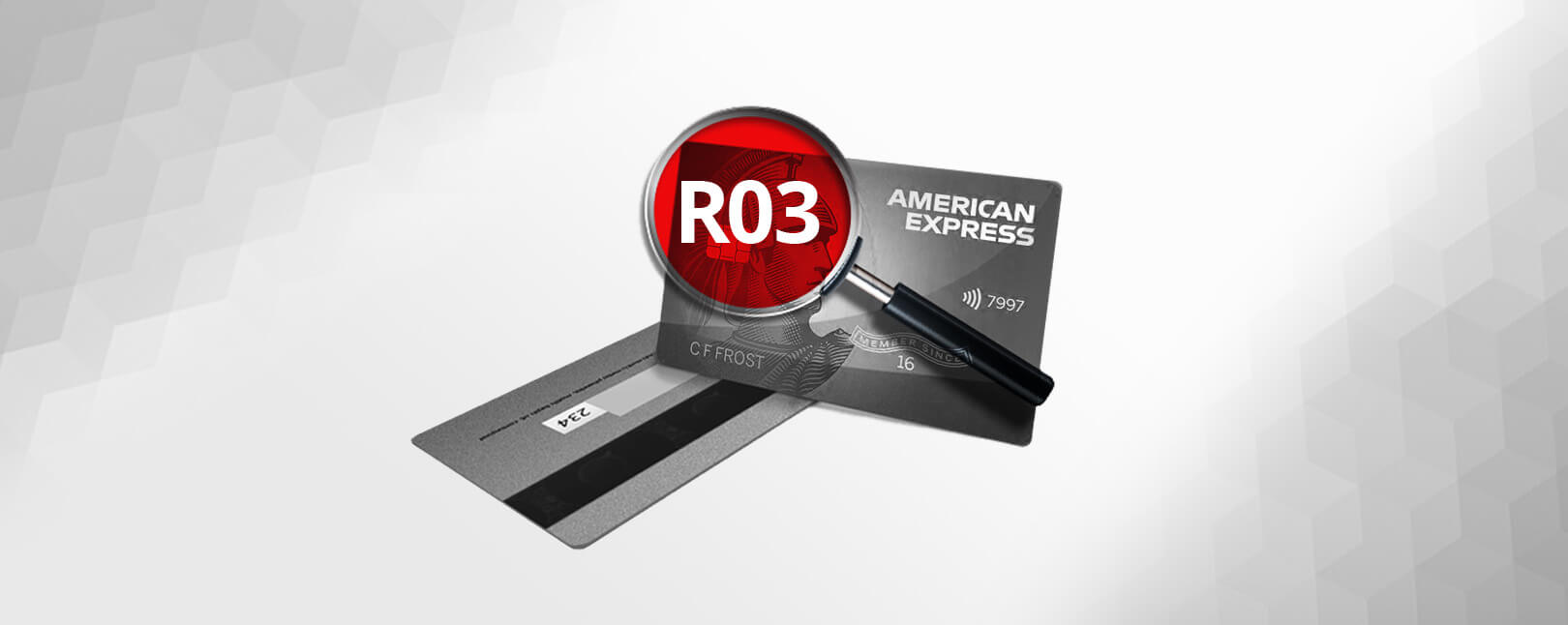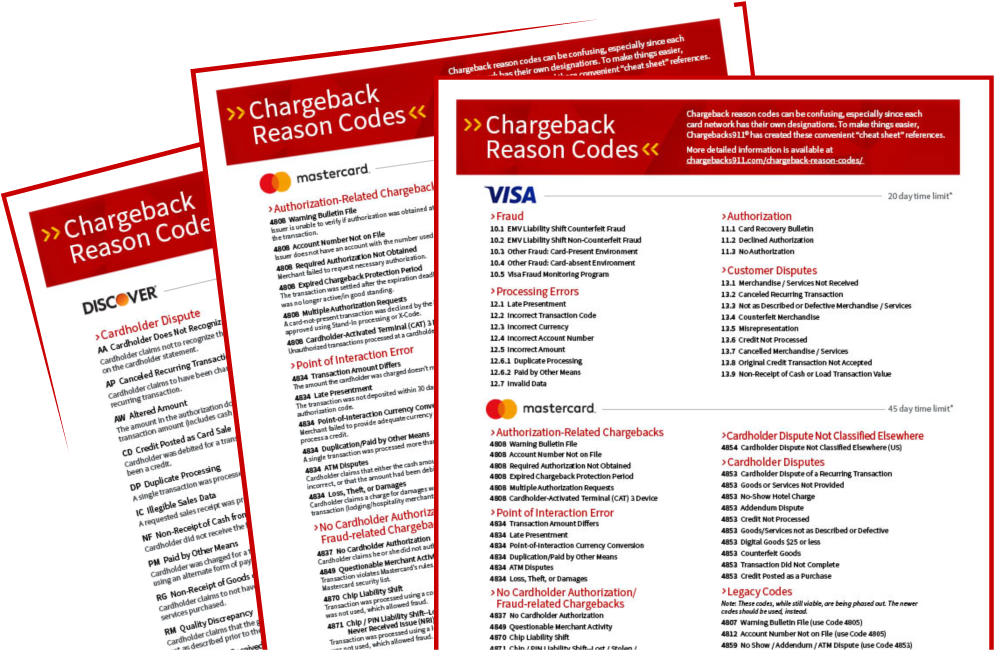
How to Handle Amex Reason Code R03 Chargebacks
American Express breaks down the acceptable causes for a customer to dispute a credit card transaction in their dispute guidelines. This is done for the sake of simplicity and standardization.
Each chargeback trigger has a designated “reason code.” Amex can then assign the appropriate code to each case to show the given reason for the chargeback.
Learn more about Amex reason codes
Today, we’re looking at one reason code in particular — R03 — and exploring the causes, timeframes, fees, and other specifics. We’ll also explore what you can do to prevent these chargebacks from happening.
Recommended reading
- Best Credit Card Processing Companies of 2025 REVEALED
- Credit Card Disputes | Step-by-Step Process Guide for 2025
- Mastercard Chargeback Time Limits: The 2025 Guide
- Chargebacks911® are Finalists for ‘Outstanding CX in Digital Sales Strategy’ for 2025!
- How to Detect Fraud: Top 20 Tips to Stop eCommerce Scams
- Verifi Order Insight: Using Data to Block Visa Disputes
What is American Express Reason Code R03?
American Express chargeback reason code R03 is “Insufficient Reply.” This reason code is used to explain that you did not provide sufficient documentation in response to an inquiry.
To help you better understand, let’s go back a bit, to before Amex files a chargeback. The process usually starts when a customer reaches out to Amex to ask about a suspicious or otherwise questionable transaction. Amex then goes to the merchant and submits and inquiry notification, requesting documentation about the customer’s claim.
If the merchant does not submit the documentation, or provide support as requested, then Amex may respond with a reason code R03 chargeback.
What Caused This Dispute?
Amex Chargeback Reason Code R03 is primarily issued because a cardholder has already flagged a transaction as suspicious or problematic, but you have not responded to the necessary documentation. At least, not to Amex’s satisfaction.
To demonstrate, this scenario can arise if:
How to Respond to Amex Reason Code R03 Chargebacks
So, what if you can establish that you addressed the cardholder’s inquiry, and provided all the documents requested by Amex?
Naturally, if you get an Amex R03 chargeback, you'd want to settle the matter as quick as possible. If you think the chargeback was filed by mistake, you have the right to fight it through a process called representment.
Representment involves contesting a chargeback and presenting evidence to the card issuer (in this case, American Express). The goal is to verify that the transaction was legitimate, and that you complied with their policies. This process typically requires some vital pieces of evidence.
Additionally, be mindful of the strict timeframe. You have just 20 days to submit your response to American Express. This period includes the time taken for your acquirer to notify you of the dispute and the time they spend reviewing and forwarding your case, too. That means you often have just five days or fewer to prepare and submit your response.
Acceptable Evidence for Amex Reason Code R03 Responses
You can re-represent these charges under the condition that you have compelling evidence.
For American Express reason code R03 chargebacks, Amex guidelines say that the only acceptable response is to provide proof that you already provided a credit to offset the amount charged. For example, the record of a credit to the buyer that’s equal to the amount being disputed.

If you’re confident that you already submitted the evidence requested, you can try reaching out to American Express (through your acquirer) to clarify that you already gave them the documents requested. A reversal in one of these cases is unlikely, though.
The success of representment depends on the thoroughness and relevance of the evidence provided. Maintaining detailed records of transactions and communications with customers is vital to effectively counteract all chargebacks, including those under reason code R03.
How to Prevent Amex Reason Code R03 Chargebacks
As the old adage goes, “an ounce of prevention is worth a pound of cure.”
You may never be able to stop chargebacks entirely. But, you can limit your exposure to risk and keep your chargeback ratio in good standing by adopting a few best practices. Generally speaking, you’ll want to:
#1 | Respond Quickly to Inquiry Notifications
If you get a message from Amex requesting information about a transaction, make sure you respond as quickly as possible. These messages have due dates, and Amex will escalate to an R03 chargeback if you don’t respond in time.
#2 | Address the Inquiry
Make sure that you provide information that addresses the cardholder’s question directly. For example, if the cardholder asks why they were charged a non-refundable cancellation fee, highlight the language in your terms where you explain that this fee will be charged.
#3 | Address Amex’s Request
If American Express requests specific documentation — for example, your cancellation or return policy, or your terms and conditions of service — make sure you include that document. They’re asking for it for a reason.
#4 | Explain Yourself
If you’re only issuing a partial credit to the buyer, make sure you fully explain why. Include the documentation that outlines this decision, as well as proof that the cardholder was shown the document before the purchase.
Take a Wider View
You can dispute invalid chargebacks from Amex reason code R03. However, it’s much more efficient to take a proactive stance. The same is true of the other chargeback reason codes, as well. A truly effective chargeback management strategy must encompass prevention as well as disputing cases of friendly fraud.
Chargebacks911® can help your business manage all aspects of chargeback reason codes, with proprietary technologies and experience-based expertise. Contact us today for a free ROI analysis to learn how much more you could save.
FAQs
Does Amex investigate chargebacks?
Yes. American Express investigates chargebacks by reviewing the evidence provided by both the merchant and the cardholder to determine the legitimacy of the transaction and decide on the chargeback claim. This process ensures a fair resolution based on the documentation and arguments presented by both parties.
What is the reason code for a chargeback on American Express card?
An American Express chargeback reason code is a code that identifies the specific reason a cardholder or issuing bank has disputed a transaction, guiding the merchant on the nature of the dispute and what evidence may be required to contest it. Each code corresponds to a particular issue, such as unauthorized use, processing errors, or non-receipt of goods or services. Click here to see a full list of Amex reason codes.
Do police investigate chargebacks?
Police typically do not investigate chargebacks as they are considered a dispute between the merchant and the cardholder, handled through the card issuer's internal processes. However, if fraud is suspected as the cause of a chargeback, law enforcement may be involved in investigating the fraudulent activities.
How successful are Amex disputes?
The success of an American Express dispute depends on the merchant's ability to provide compelling evidence that the transaction was valid and in accordance with Amex policies. Success rates vary widely based on the nature of the dispute and the quality of the documentation provided by the merchant.
How does American Express investigate disputes?
American Express investigates disputes by reviewing documentation and evidence provided by both the cardholder and the merchant, such as transaction receipts, proof of delivery, or communication records, to determine the validity of the chargeback claim. This process aims to ensure a fair resolution based on the facts presented by both parties.









